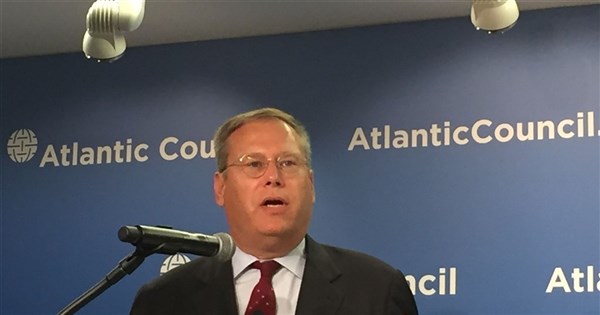Washington, April 4 (CNA) As a 32 percent U.S. tariff on Taiwanese goods looms, a former U.S. diplomat told CNA that Taiwan should clearly express to the United States that the “reciprocal tariff” is unfair and unjustified, noting that despite an imbalance, the Taiwan-U.S. trade relationship is “mutually beneficial.”
“Both the Taiwan government and Taiwan industry should make a clear and forceful case to the U.S. that ‘reciprocal tariffs’ are unfair, excessive, and unjustified,” said Kurt Tong, a former U.S. diplomat who now serves as the Managing Partner at The Asia Group, a strategic advisory firm based in Washington D.C.
The “reciprocal tariffs” Tong referred to stem from an announcement made by U.S. President Donald Trump on Wednesday, in which he unveiled sweeping “reciprocal tariffs” on dozens of countries, including Taiwan, whose exports to the U.S. face a 32 percent import duty starting April 9.
In an interview with CNA on Thursday, Tong noted that Trump has said that the “reciprocal tariffs” are based on a calculation of both tariff and non-tariff barriers imposed by Taiwan on entry into the Taiwanese market by American exporters.
“But I think the calculation seems flawed and excessive,” said Tong, who served as the principal deputy assistant secretary for economic and business affairs at the U.S. State Department from 2014-2016.
He added that the measure comes with an agenda “beyond reciprocity,” including forcing investment into the U.S. and boosting government revenue.
Echoing Tong, Riley Walters, a senior fellow at the Hudson Institute specializing in international economics, told CNA that the calculations behind the new U.S. tariffs are based on “bad math” and appear “quite unfair.”
“What the White House has been doing is they will mention tariffs and they will mention non-tariff barriers, but the calculation that they’ve used is based purely on the trade deficit,” Walters said.
He noted that the Trump administration is “by proxy” saying that the trade deficit is an immediate result of those tariffs and non-tariff barriers, “which isn’t entirely true at all.”
Walters also said it is unlikely Taiwan imposes such high tariffs, adding that much of the U.S. trade deficit stems from American demand for products like routers, servers and other ICT goods.
Tong said that while the Taiwan-U.S. trade is imbalanced due to Taiwan’s trade surplus with the U.S., the trade relationship between the two countries is actually “mutually beneficial.”
“U.S. companies benefit not just from their sales to Taiwan, but also from the imports that the U.S. buys from Taiwan — so that case needs to be made clearly and forcefully,” Tong said.
Tong added that it “makes sense” for Taiwan’s government to seek negotiations with the Trump administration but noted that achieving a successful outcome would be a “complex and difficult process.”
“This will take some time,” he said.
Following the same vein, Walters predicted that tariff reductions for countries like Taiwan, which face rates above 10 percent, are unlikely to happen within the coming week — but could come “six months from now, a year from now.”
“The real costs of these tariffs are starting to be seen in the U.S. economy, not just the stock market — so maybe then there’s an opportunity,” Walters said.
Holding an opposite view, Jeffrey Kuo (郭哲瑋), an economics lecturer at George Washington University, said the “reciprocal tariffs” are likely a short-term policy aimed at fulfilling Trump’s campaign promise to bring manufacturing back to the U.S., with more political symbolism than economic substance.
Kuo said there is about a week before the “reciprocal tariffs” take effect, and the Trump administration is likely to use that window to engage in talks with other countries, using the measure as leverage to achieve certain goals — after which the tariffs could be reduced.
If the “reciprocal tariffs” are imposed as scheduled next Wednesday, Kuo said it could signal the beginning of a new era of protectionist trade policies around the globe. For export-driven economies like Taiwan, he added, “this is not a good thing.”
